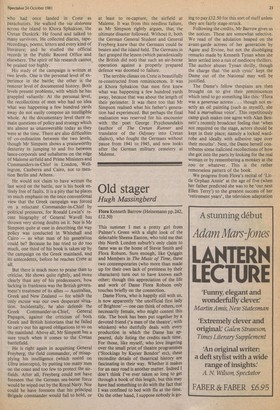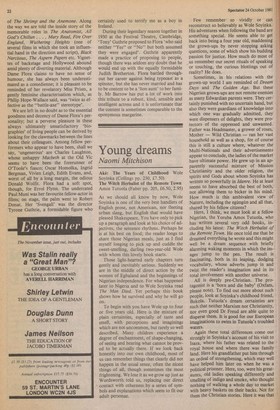Old stager
Hugh Massingberd
Flora Kenneth Barrow (Heinemann pp.242, £12.50) This summer I met a pretty girl from Palmer's Green with a slight look of the delectable Sheena Easton, who told me that this North London suburb's only claim to fame was as the home of Stevie Smith and Flora Robson. Sure enough, like Quiggin and Members in The Music of Time, these two contemporaries (who more than made up for their own lack of prettiness by their characters) turn out to have known each other; though this appreciation of the life and work of Dame Flora Robson only touches briefly on the connection.
Dame Flora, who is happily still with us, is now apparently 'the unofficial first lady of Brighton' — one can think of others, not necessarily female, who might contest this title. The book has been put together by a devoted friend Ca man of the theatre', with whiskers) who dutifully deals with every production in which the Dame has appeared, duly listing the credits each time. For those, like myself, who love lingering over the small print of theatre programmes (`Stockings by Kayser Bondor' etc), these recondite details of theatrical history are fascinating in their way. Whether it makes for an easy road is another matter. Indeed I don't think I've ever taken so long to get through a book of this length, but this may have had something to do with the fact that I was confined to bed with flu at the time. On the other hand, I suppose nobody is go ing to pay £12.50 for this sort of stuff unless they are fairly stage-struck.
Following the credits, Mr Barrow gives us the notices. These are somewhat selective. We read of the adulation heaped on the avant-garde actress of her generation by Agate and Ervine, but not the disobliging remarks made by Kenneth Tynan when she later settled into a run of mediocre thrillers. The author abuses Tynan shrilly, though the charge that 'the arch cynic' kept the Dame out of the National may well be justified.
The Dame's fellow thespians are then brought on to give their reminiscences which tend to go something like this: 'Flora was a generous actress. . . though not exactly an oil painting (such as myself), she had a marvellous voice'. This repetitiously camp gush makes one agree with Alan Bennett's recently broadcast feeling that 'when not required on the stage, actors should be kept in their place; namely a locked wardrobe and ideally with adhesive tape over their mouths'. Next, the Dame herself contributes some italicised recollections of how she got into the parts by looking for the real woman or by remembering a monkey at the zoo or whatever. This is the rather remorseless pattern of the book.
We progress from Flora's recital of 'Little Orphan Annie' at the age of five (when her father predicted she was to be 'our next Ellen Terry') to the greatest success of her 'retirement years', the television adaptation of The Shrimp and the Anemone. Along the way we are told the inside story of the memorable roles in The Anatomist, All God's Chillun . . . , Mary Read, Fire Over England, Wuthering Heights (one of several films in which she took an influential hand in the direction and script), Black Narcissus, The Aspern Papers etc. Vignettes of backstage and Hollywood abound amid plenty of diverting material. Although Dame Flora claims to have no sense of humour, she has always been underestimated as a comedienne; it is pleasant to be reminded of her revelatory Miss Prism, a gently feminine characterisation which, as Philip Hope-Wallace said, was 'twice as effective as the "battle-axe" stereotype'.
We are left in no doubt as to the essential goodness and decency of Dame Flora's personality; but a perverse pleasure in these always ultimately unsatisfactory 'biographies' of living people can be derived by looking for the clawmarks between the lines about their colleagues. Among fellow performers who appear to have been, shall we say, 'ungenerous' are Charles Laughton, whose unhappy Macbeth at the Old Vic seems to have been the forerunner of O'Toole's fiasco; Oscar Homolka, Ingrid Bergman, Vivien Leigh, Edith Evans, and, worst of all by a long margin, the odious Donald Wolfit. Flora had a soft spot, though, for Errol Flynn. The underrated Paul Muni was her favourite fellow-actor in films; on stage, the palm went to Robert Donat. Her `Svengali' was the director Tyrone Guthrie, a formidable figure who certainly used to terrify me as a boy in Ireland.
During their legendary season together in 1930 at the Festival Theatre, Cambridge, 'Tony' Guthrie proposed to Flora 'who said neither "Yes" or "No" but both assumed they were engaged'. Guthrie apparently made a practice of proposing to people, though there was seldom any doubt that he would end up with the equally formidable Judith Bretherton. Flora battled throughout her career against being typecast as a spinster, but she has never married and has to be content to be a 'lion aunt' to her family. Mr Barrow has put a lot of work into this tribute to a robust, kind, sensible and intelligent actress and it is unfortunate that the content is sometimes comparable to the eponymous margarine.



































 Previous page
Previous page